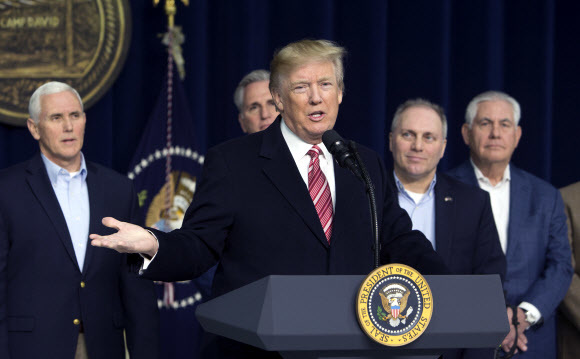Posted on : Jan.8,2018 16:41 KST
Modified on : Jan.8,2018 17:06 KST
 |
|
US President Donald Trump holds a press conference at Camp David on Jan. 6. (UPI/Yonhap News)
|
On Jan. 7, North and South Korea exchanged lists of negotiators, finalizing the delegations that will attend the high-level talks scheduled for Jan. 9. Just one day after South Korea sent its list of representatives, the North responded with its own list. The two sides appear to be actively laying the foundation for rebuilding the bridge of severed dialogue. Things are starting more smoothly than in the past, when there was much more quibbling over the rank of the negotiators.
While it’s unusual for both the Minister and Vice Minister of Unification to participate in negotiations simultaneously, that shows just how firmly Seoul is committed to improving inter-Korean relations. North Korea’s delegation strikes a solid balance with South Korea’s. While the talks have been sparked by the Pyeongchang Winter Olympics, the state of inter-Korean relations is too grave and desperate to limit them to that topic. The talks are beginning with the Pyeongchang Olympics, but they must conclude in ongoing inter-Korean dialogue. We hope that the team of negotiators centered on the Unification Ministry marks the beginning of crafting a framework for stable inter-Korean dialogue.
To be sure, many tall mountains and rugged passes still remain to be climbed. Since these inter-Korean talks are taking place against the backdrop of the international community’s sanctions against North Korea, the government has very few options at its disposal. First of all, after working through the issues surrounding North Korea’s participation in the Pyeongchang Olympics, the South Korean government’s approach should be to methodically proceed to reunions for the divided families and military talks. At such a time as this, it’s important to focus on keeping the spark of dialogue alive, rather than on achieving major results.
The resumption of inter-Korean dialogue is also providing more diplomatic options to US President Donald Trump, who has failed to find any method more effective than military threats and a “war of words.” That’s probably also why Trump is leaving open the possibility of dialogue with North Korean leader Kim Jong-un. Effectively dealing with the Pyeongchang Olympics issue will show that progress can be made in improving not only inter-Korean relations, but also relations between North Korea and the US.
What is quite worrying is that some of South Korea’s conservatives have been focused on finding fault with the ongoing interaction between North and South Korea. Whenever possible, they make mountains out of molehills and pontificate about a rift in the South Korea-US alliance. One of the best examples of this is a report by the Chosun Ilbo quibbling that the phrase “100% support” was not mentioned during the phone conversation between South Korean President Moon Jae-in and US President Donald trump on Jan. 4. But in the subsequent press conference, Trump openly declared that he supported inter-Korean dialogue 100%. You can’t help but wondering who exactly is sowing discord in the South Korea-US alliance.
The Liberty Korea Party has taken this a step further. It has disparaged inter-Korean dialogue as “talks for talks’ sake” before the two sides have had a chance to sit down together, and it has expressed concerns that flying the Korean Unification Flag at the Pyeongchang Olympics will earn the scorn of people around the world. Whenever the Korean Unification Flag has made an appearance at international sporting events such as the 2000 Sydney Olympics, the international community has offered unstinting praise of North and South Korea’s efforts to bring about peace. Even if these conservatives aren’t willing to do their part to make the Pyeongchang Olympics a success, do they really have to throw cold water on the mood for dialogue that has taken shape after so long?
Please direct questions or comments to [english@hani.co.kr]






